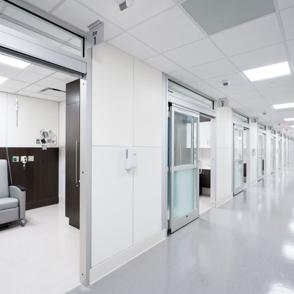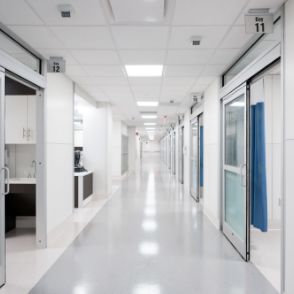The importance of nurses’ stations cannot be underestimated as they are an essential element of any healthcare environment. They serve as central coordination points, bringing together communication, clinical operations and patient monitoring in one integrated area.
As demands on healthcare infrastructure continue to rise, the design and functionality of nurses’ stations have become increasingly important, not just for efficiency but for the delivery of safe, high-quality care.
This blog explores why nurses’ stations play a vital role in hospital layouts, how they contribute to staff wellbeing and patient safety and why modular construction offers a long-term solution to evolving healthcare needs.
Central to Clinical Coordination
Nurses’ stations are more than desks, they’re clinical control centres. Staff rely on them to access electronic health records, coordinate treatments, respond to emergencies and maintain oversight of patient care.
In many UK hospitals, these stations are shared by multiple disciplines, including nurses, healthcare assistants and allied health professionals. A well-designed nurses’ station provides clear lines of sight to patients, promotes rapid communication among care teams and ensures essential documentation and equipment are within reach.
According to the NHS’s Health Building Note 00-03: Clinical and Clinical Support Spaces, design layouts should support “efficient observation and supervision of patients”, highlighting the operational role that nurses’ stations must fulfil.
Impact on Staff Workflow and Efficiency
The location and layout of nurses’ station desks can significantly influence how efficiently clinical teams work. Poor placement often leads to increased walking distances, unnecessary movement and workflow bottlenecks – all of which can slow down response times and contribute to fatigue.
A 2020 study published in BMJ Open found that efficient ward layouts and shorter staff travel distances were associated with improved care delivery and reduced error rates.
Supporting Staff Wellbeing and Focus
Healthcare environments are fast-paced and often stressful. Nurses’ stations should therefore provide a space where staff can focus, document care clearly and communicate without constant interruptions.
Design elements such as acoustic control, ergonomic layouts and designated zones for clinical and administrative tasks can help reduce cognitive load and support mental wellbeing. These are increasingly seen as essential in settings like critical care and mental health units, where noise and environmental stress can directly affect both staff performance and patient experience.
The Advantages of Modular Nurses Stations
Adapting traditional nurses’ stations to meet changing needs can be complex and time-consuming. Modular construction offers a solution that balances functionality with flexibility.
At Architectural Wallsz, we develop prefabricated nurses station desks and casework that meet the practical demands of clinical spaces while remaining adaptable to future changes. These include:
- Pre-installed power, data and med tech infrastructure
- Durable, easy-to-clean surfaces suitable for infection control
- Acoustic management features to improve concentration
- Fast, precision manufacturing and installation
Custom-designed, modular stations can be delivered and installed with minimal disruption.
Meeting NHS Priorities
The NHS Long Term Plan and Hospital 2.0 framework emphasises adaptability, infection prevention and improved clinical environments. Nurses’ stations must reflect this shift by moving beyond standard casework and towards multi-functional designs that serve both staff and patient needs.
According to NHS guidance, hospitals should “create environments that improve care quality, support teamwork and streamline processes”. A nurses’ station that is poorly located or difficult to adapt can become a barrier to all three.
Importance of Nurses’ Stations
As healthcare continues to evolve, so too must the spaces that support it. Nurses’ stations are not secondary considerations but an integral part of how care is and should be delivered. Investing in high-performance, modular solutions can improve day-to-day operations, reduce maintenance burdens and support staff in providing responsive, patient-centric care.
At Architectural Wallsz, we work with healthcare providers to deliver nurses stations that align with NHS standards, support operational efficiency and are ready for the demands of modern care delivery.






Sorry, the comment form is closed at this time.